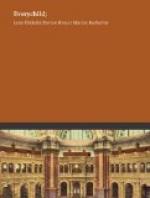And then Everychild listened attentively while Truth declared to the assembled band: “If you would really find your parents again, and be happy with them, you must promise one thing only: that you will love them better than you love yourselves.”
And all the children, having forgotten many of the hardships they had undergone at home, replied almost in one voice—
“We promise!”
Then after they had remained silent a little while, wondering how they were to find their parents, from whom they had wandered so far, they began to inquire how so difficult a thing could be brought about; and they were informed that it was true that one great obstacle still lay in the way of their return to their parents, but that perhaps it would be possible to remove that obstacle.
They drew apart, whispering among themselves and looking beamingly into one another’s faces.
They were startled suddenly by a great voice, crying out in anguish—
“Lady—dear lady!”
It was the giant, who had remained apart a little because of his blindness. He was now approaching Truth, his hands outstretched.
“I am here,” she said. And he came and knelt by her side.
CHAPTER XXX
WILL O’DREAMS MAKES A DISCOVERY
For a moment the giant remained silent, his heart so torn by doubt and fear that he could not speak. But at length he said: “I have heard how you would restore the children to their parents . . .”
“I hope to do so,” replied Truth.
He cried out in sorrow, “Yet none may restore me to my mother, whom I have lost.”
“Be not so sure of that!” she said.
Whereupon hope was kindled in his heart. He pondered, feeling that he was in the presence of one who was very wise and kind. And then he said:
“And I have heard Everychild say that you are beautiful.”
She did not reply to this. She waited for him to continue.
“You will forgive me for speaking what is in my heart,” he said at length, “But my own mother, from whom I was driven by cruel, stupid persons long ago, was very beautiful. And I have always dreamed that some day I should encounter a beautiful lady and that she should prove to be the mother I lost.”
She replied to him in a low voice: “And by what sign or token should you recognize her, if you were to encounter her again after all these years?”
“Alas, what hope is there for me, now that I am blind? While I could yet see I hoped to know her by her calm glance, by the serenity that never was troubled by any evil chance . . . I cannot say; but I never would believe that I should not be helped to recognize her.”
She meditated a little. And presently she said, as she leaned closer to him, “And did you never give her anything—a token, perhaps—that she might have treasured and kept, by which you might recognize her?”




